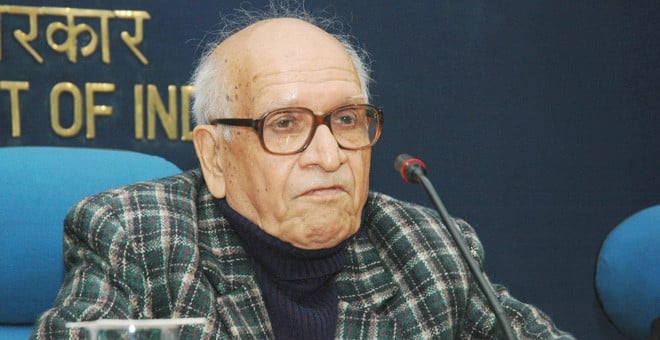
Professor Emeritus Bipan Chandra was a guru of Indian historians -- popular among school students as well as scholars

A teacher, scholar and activist, Professor Bipan Chandra passed away peacefully in his sleep on the morning of August 30, 2014. He along with Prof. Romila Thapar established the Modern History Department of Jawaharlal Nehru University (JNU), Delhi.
Chandra was born to Toota Ram, a lawyer, on May 27, 1928 in Kangra (Himachal Pardesh). After matriculation he joined Forman Christian College (FCC), Lahore from where he did his BSc. Then he went to Stanford University to do his Masters in Aeronautical Engineering but found that science was not his cup of tea. So he switched to international affairs and turned a Marxist. He remained a member of the Communist Party of India for some years.
In his teens he had a brief love affair with RSS but he soon discovered its communal basis.
Although I have read most of his writings, I leave it to the historians to deal with his works. He wrote a number of path-breaking books besides hundreds of articles. He was one of the few Indian scholars respected by the international community of historians.
According to his students and colleagues, Mridula and Adytiya Mukherjee, he was people’s historian because he not only wrote scholarly works but also became extremely popular. He came in direct contact with thousands of people, apart from the thousands he taught in his 43 year long teaching career. What was unique about him was his ability to combine the popular and the scholarly -- the writing for school children and high level research. He was an activist scholar. He would deliver lectures all over India; after the lecture, the students would sit with him till late night.
In 1980 I along with my wife Amina went to India. We went to JNU old campus to meet Bipan and Romila. They welcomed us and took us to the cafeteria and discussed Pakistani politics. It was the time of General Zia’s martial law.
He had special interest in Bhagat Singh. He discovered and got printed an article written by the great revolutionary a couple of weeks before his hanging at Lahore jail -- Why I am an atheist. He gave me a few copies of it.
I was lucky to meet the professor after more than two decades. I took the risk of taking public transport to his house in Media Centre, Gurgoan although I did not have the visa. I could feel that I was being chased by khufiawala of India.
The professor was very kind. He offered me lunch besides his books and I was finally able to interview him for The News on Sunday in 2004.
Before my next visit to Delhi, I emailed Professor Bipan to arrange for our stay at the JNU guest house. When we tried to make the payment, the professor said, "Keep this money to buy books."
Prof Bipan Chandra was chairman of National Book Trust from 2004-2012. I am neither a scholar nor a man of academia. I don’t know why Bipan asked me to write a book on Pakistan to be published by the NBT of India. I expressed my inability to write a book. But it was the kindness and persuasive power of Professor Sahib that I signed a contract with NBT. I did submit a draft knowing in the heart of my heart that it would not be approved. And that is exactly what happened.
When Bipan Chandra visited Lahore, he was very keen to see the archives at Punjab Secretariat to dig out material about Bhagat Singh’s trial. I remember Prof. Tahir Kamran helped him a lot.
I went to Delhi to condole the death of his wife Usha, a former member of Indian Foreign Service. Bipan Chandra’s health deteriorated after the death of his wife.
His death is indeed a personal loss; I have lost a senior, loving and caring friend but it is indeed a greater loss for the historian community of the world.
My biggest regret is that he gave me a book on Bhagat Singh which I lent to Intizar Hussain Sahib and lost it forever.
Going through his interview he gave me, I discovered how prophetic his prediction was about BJP. I had asked him in 2004 if he thought the BJP would come back. And he said yes. "Yes because since 1952, no major educative campaign has been carried out among masses. When Ram Janambhoomi agitation was going on I pointed out that BJP was carrying out a systematic campaign. They were taking bricks for building the temple from every home particularly in the Jat belt. For the first time Jats voted for BJP in 1991 and then again in 1996."
I have to thank late Bipan Chandra for arranging my interview with Prof Romila Thapar, a great historian in her own right. And I must apologise to him because I could not produce a book on Pakistan to be published by the National Book Trust of India.
His lifelong desire was to write a book on Bhagat Singh but alas he left behind an unfinished manuscript of Singh’s biography. He wanted that Pakistani and Indian students should study in each other’s educational institutions.
In the present milieu, Prof Bipan’s work on communalism should be reproduced and translated here in Pakistan because both Pakistan and India are threatened by religious extremism.